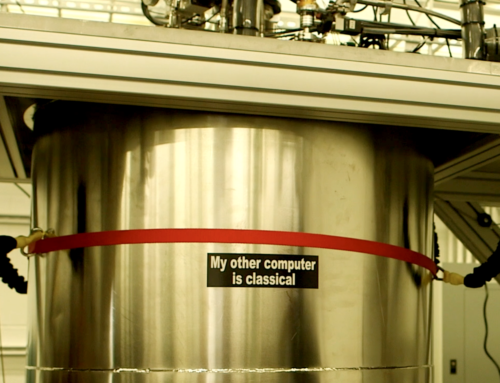Feature image via Inverse
By James Der Derian and Gabriella Skoff
Fittingly, the first news flash came from a Google Scholar alert, by way of a post on the NASA website: Google had achieved ‘quantum supremacy’ with its 53-qubit Sycamore processor. NASA then pulled the article – probably for lack of proper vetting – but the quantum resonance machine plus a few conspiracy theories were already off and running, including a claim from Andrew Yang that classical encryption was in dire jeopardy (as too are his hopes to win the nomination for Democratic President).
First coined in 2011 at the 25th Solvay Conference by Caltech theoretical physicist John Preskill, quantum supremacy signifies a critical step in the development of quantum computing, whereby a quantum computer is capable of outperforming a classical computer at a given task. This long-awaited moment among quantum researchers and enthusiasts would mark a major breakthrough in quantum computing that is likely to accelerate research and development of quantum computers. This could lend a significant boost, helping quantum computers to achieve their promise sooner. It might even give quantum sceptics a moment’s pause. It does not mean that all your emails are now readable by Google (though the NSA may be another story).
From the outset, the concept of quantum supremacy has carried a lot of semiotic baggage. For some, supremacy suggests a competitive race to the finish line or to the top of the charts, as when the Supremes took Motown in the 1960s. For others, the term carries the taint of another kind of race, as when white supremacists’ chants asserted racial superiority in the streets of Charlottesville, Virginia.
It is not difficult to see why the term quantum supremacy continues to mislead today. Specifically, it signifies a very narrow benchmark of performance, demonstrating that quantum computers will be vastly better at some tasks than classical computers. However, until they scale up in qubits, achieve functioning levels of error-correction and most importantly, become more competitive in cost, it is highly unlikely that quantum computers will challenge the hegemony of classical computers in the near or mid-term. The areas in which they could eventually prove exponentially superior to classical computers include optimization, simulation, sensing and yes, encryption/decryption. If and when the relative utility of quantum computers improves, we can then begin to assess what a quantum advantage will be over classical computers.
Although the definition of quantum supremacy comes in the neutral gray of science, Preskill’s early parsing of the achievement as either ‘really, really hard’ (perhaps possible to achieve in a few decades) or ‘ridiculously hard’ (unlikely to occur even within the century) contributed an almost biblical hermeneutic to the eventuality, of a holy grail or deux ex machina that would forever change not only how we compute but also how we would soon live in a quantum age. The flurry of claims and counter-claims over the past week only added to the super-naturalisation of quantum computing. It might be worth taking a step back, to consider what we know and what we might yet find out.
When Project Q visited Google’s quantum computer team, led by physicist John Martinis of the University of California, Santa Barbara, he told us of the team’s plans to submit its prototype device to a civilian body for testing. Last November, Google reported that ‘Bristlecone’, its 72-qubit superconducting quantum device, would be connected to NASA Ames for testing of quantum supremacy against NASA’s powerful petaflop-scale Pleiades supercomputer (in the top 25 of the world).
After a few months of silence there were unconfirmed reports that Bristlecone proved too error-prone. The team decided to downshift their efforts, instead using ‘Sycamore’, a 54-qubit chip device. According to the original source, ‘Sycamore’ passed the necessary two-qubit error rate (below 0.5%) and was able to perform (minus one failed qubit) a superposition calculation of random circuits involving 250 or 260 complex numbers in three minutes and twenty seconds—one that would take today’s most advanced supercomputer, known as ‘Summit’, around 10,000 years to perform. Following the precise meaning of the term, and once peer-reviewed (likely in the next month), Google will be able to claim that Sycamore achieved quantum supremacy over Summit. Score one for deciduous trees over geological features! But stay tuned for Bristlecone (a tree which grows on summits!).
Further readings:
In the news:







[…] Project Q and others have explained in coverage of Google’s announcement, the terminology used can be misleading at best and simply a product of […]
[…] news of Google’s possible achievement of quantum supremacy, quantum computing’s promise in a […]